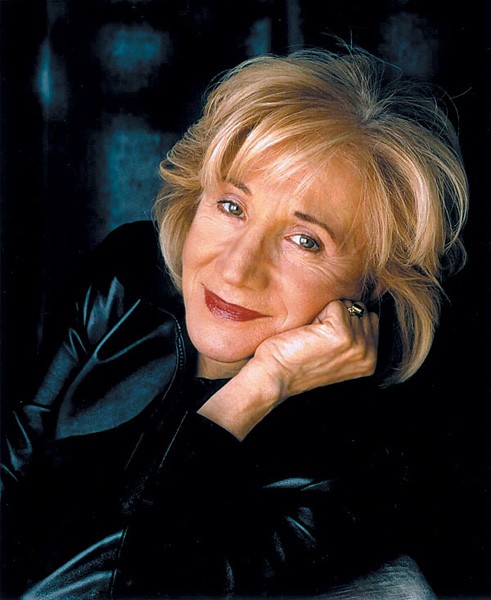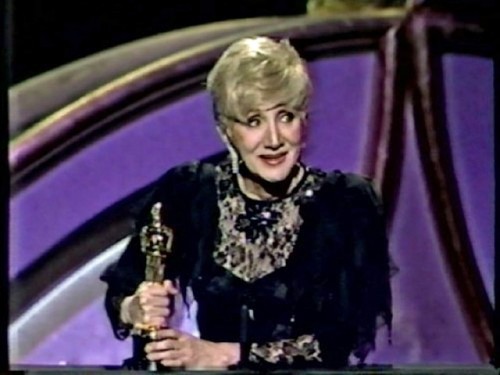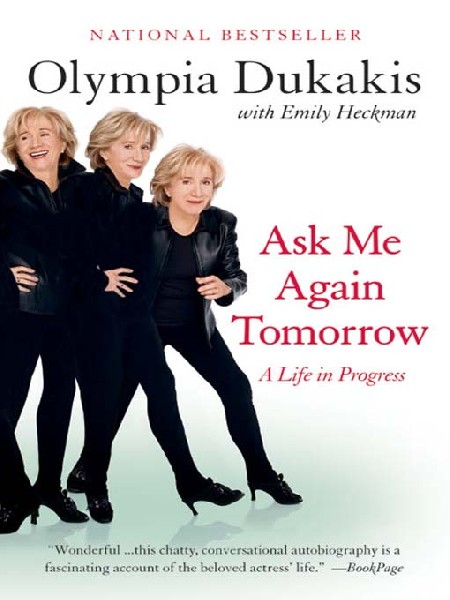Olympia Dukakis Returns to Shakespeare & Company
Talking With a Titan of the Theater
By: Larry Murray - Aug 29, 2009
The life of Olympia Dukakis could easily be divided into two halves: the first fifty years of regular hard work on stage and the two decades since her life changed when she won the 1987 Academy Award as Best Supporting Actress in Moonstruck. She was 56 when she played Cher's sardonic mother in that comedy.
Speaking with her by phone at her loft in New York, we quickly discovered that her sense of humor is as sharp as ever. Mention how her working with Cher might have helped develop her almost cult-like following among gay men, she quickly replies: "And it didn't hurt Cher's reputation at all to have worked with me." Don't let the gray hair fool you, she is one gloriously feisty, funny and alive human being.
It's great news that this grand actress, the one with the perpetually forlorn look and worldly wise demeanor is making her way back to the Berkshires. She will appear Monday, August 31, at 7:00 PM at Shakespeare & Company to help kick off the company's 15th Annual Studio Festival of Plays which hits full stride a week later, on September 7 with a marathon of new works.
She will join other Shakespeare & Company luminaries in a reading of Leap Year written by William Coe Bigelow and directed by Tony Simotes.
"Tony is a colleague and friend whom I am eager to support," she said. "He sent me the play and I liked it, in fact I liked it a lot. It's a wonderful play. It shows what happens to couples that are estranged. It's very dramatic, but here's quite a bit of humor in it, too."
Wondering if she would be staying long, she followed with some news: "We are also talking about my coming to do The Tempest next season, an adaptation that I have done myself, so we'll see what will happen." Dukakis' roots with the S&Co. family reach back to the 1970's, when she was an acting teacher for founding Company members Simotes, Dennis Krausnick and Kevin G. Coleman at New York University. In 1998, her groundbreaking The Lear Project (later expanded into Queen Lear), directed by Krausnick and featuring Dukakis as Lear and Founding Artistic Director Tina Packer as the Fool, sold out its run at S&Co. She has since co-adapted The Other Side of The Island, based on Shakespeare's The Tempest. It appears likely that we will see her on stage in Lenox again next season, though we will have to wait for the company's official announcement for possible dates and specifics.
Dukakis has a special place in her heart for the Berkshire company. "This is a place where we can explore the deep resonances of Shakespeare's work, as well as the most thought-provoking voices of our own day. So there's no better place to bring William Bigelow's exciting new play."
Like most actors, Dukakis relishes the opportunity to explore new plays with theater-goers, such as this Leap Year reading. "I really enjoy that sort of exploration in a community of people. That's what I really like. All those people come, and sit together, and then we all go through this experience, and some aspect of our humanity is touched. Questions that confound us emerge, and we leave richer for the experience," she enthused.
Life as an actress, director and teacher has hardly been easy. In the sixties she appeared at the Charles Playhouse in Boston while her cousin Mike was just getting his feet wet in politics in Brookline.
After first meeting him onstage at the Williamstown Theatre Festival, she dated, then married Louis Zorich in 1970, and the couple relocated to Montclair, New Jersey to raise a family. Together, they founded The Whole Theatre Company (1973-1990) and balanced the needs of raising three young children with her work as actress, director, producer and teacher. Time was precious, as was psychic energy.
She worked with Tony Simotes at The Whole Theatre as well as later at Saratoga and Wisconsin where she conducted Master Classes for him. Other actors who appeared there were Jose Ferrer, Colleen Dewhurst, Blythe Danner and Samuel L. Jackson, as well as Dukakis herself. Then she won her Academy Award for Moonstruck. She hoped that her newfound fame and fortune would help keep The Whole Theater going. But it wasn't to be. We harked back to the struggle all theatre companies face.
So you know about the trials and tribulations of running a theatre company? "Indeed I do," she sighed.
Do you miss it, the fun, the excitement? "I'll tell you something. Do you miss a stick in your eye?" Or an abscessed tooth? "It is hard. And as you get older it's harder. Not to do the work, that's not the frustrating part. What's hard is raising the money, building the board, staying abreast of the current things that are happening that want to sabotage and submerge you. You know what I mean?"
Running a theatre is tough enough. "But then we had a whole thing when the Mapplethorpe controversy bubbled over. We were doing a play about two lesbians having a baby. A fascinating play. And the funders are telling me, 'Sorry, we're funding health initiatives this year, Olympia. It was like the money just disappeared. And then the state followed suit, the Federal government cut the NEA, remember Jesse Helms?"
So in 1990, as financing dried up because of government budget cuts, and foundations and corporations saw which way the wind was blowing, support dwindled. Ms. Dukakis then decided to leave The Whole Theatre . ''I just lost it.'' She told the New York Times: ''Close the doors. I'm out of here. Get somebody younger.''
While her Academy Award win for Best Supporting Actress didn't save her theater company, it was a turning point of another sort, one which put her on the Hollywood map. What people don't remember is that the Moonstruck Oscar was actually the last of a stream of awards she earned for that film, including the New York Film Critics, Los Angeles Film Critics, British Film and Golden Globe awards.
Following the Oscar, "Everything changed. Before that my daughter was going to college on credit cards. After the Oscar, I could go to bed and not worry about bills."
From then on, Dukakis with her perfectly marketable head of silver hair was first in line for a number of choice matron roles: Steel Magnolias (1989), Dad (1989), Look Who's Talking (1989), The Cemetery Club (1993), Mr. Holland's Opus (1995) and Mother (1996/I). On TV, she received high praise, especially for her sympathetic transgendered landlady in the acclaimed epic miniseries Tales of the City (1993) and its sequel (the latter earning her an Emmy nomination). She is following the development of Tales of the City as a musical slated to open on Broadway in 2010. Wondering if she might land a role in that she observed that "I am probably a little too old now for the part of Anna Madrigal."
It doesn't worry her. "Because now I am a grandmother, and I love it. It's like a free ride. Your kids are doing all the worrying, and scrambling. Children and grandchildren can make you really happy. You walk in the room and there is like a glow. I often think about how fortunate we are as a family."
Now some 100 stage roles, another 100 movies and TV shows later, Dukakis is probably the busiest actor in her age group, and shows no sign of letting up. People who work with her become incredibly loyal and fond of her. She also is unafraid of trying on new and different roles, and even at the age most people take to their rockers is still actively learning and doing innovative things in the theatre.
"I love standing in front of people and telling them stories. I really enjoy that sort of exploration. I may be on stage, but it is a community event. All those people come, and sit together, and then we all go through this experience, and some aspect of our humanity is touched. Questions that once confounded us emerge and are answered, and together we grow a little more," she explained.
Among her most recent projects is the film Cloudburst. It is about two older lesbian lovers being separated as one gets committed to a nursing facility. Dukakis is to play her partner who springs her pal from the institution, and they head to Canada to get married. It's a film by Thom Fitzgerald, but "shooting just got postponed until next Spring," she lamented, frustrated.
'It's become a low budget movie now, it wasn't originally, but the bank pulled out and the drama of it, the drama! It's already gotten postponed twice, and now I am running into conflicts. I've made promises and commitments, but I can't just keep pushing my schedule. So I may have to drop out, and the part was even written for me for goodness sake. I'm doing it with Brenda Flicker (another Oscar winner), who I admire. We worked together in Borneo, on The Intended (2002), a British Dutch film. We get along great. And I love Thom Fitzgerald, I've done two other films with him - 3 Needles (2005) and The Event (2003)."
Fitzgerald should be familiar to Berkshire audiences since he appeared at Mass MoCA on October 25 of that year as part of the Williamstown Film Festival to introduce and talk about his film, The Event, which starred Dukakis.
In looking at the many other new plays in the Shakespeare & Company Festival of Plays lineup, Dukakis muses that the most important thing to look for is basic. "It's the same thing that the Greeks focused on in ancient times, the question of how are we going to live. What are you going to do. Who are you going to be. What are you going to make important in life. And of course, how shall we live.
"Every generation has to ask those questions, has to confront the problems of living anew, and to find their own way of doing and saying and finding the answers to them." So in essence, the theater is constantly reinventing itself. "Some plays are fun to read but not enjoyable to watch, while others are puzzling to read, but make sense when acted out." We need these readings to ferret out the worthy ones.
Dukakis laughed when I mentioned that people were starting to label her with the title of "legendary" actress. She thought that a better word might be a "surviving" actress. "You know when you get to my age, it's nice to be intact. Physically surviving is important." Perhaps there is more truth to what she says than most people realize. In a typical live theatre an actor performs 6-8 times a week and must give 100% each time, physically and mentally. It is quite a challenge, probably equal in its own way to twenty laps in the pool or a healthy hike.
Olympia Dukakis wrote and promoted her own book, "Ask Me Again Tomorrow: A Life in Progress" which details her life (so far) in her signature straight-talk style. It can be downloaded via Amazon or Barnes & Noble. It covers much of her life growing up in Arlington Massachusetts, and raising her own family in Montclair, New Jersey. It is short on gossip which is what some readers go for. I tell her some online reviewers have complained that it was too short, and that the margins were too wide, as if she skimped on the content. "Talk about a nightmare, two years of my life to write it," she jokes. "But now I'm going to look at the margins again," she adds, laughing. Is there to be a sequal? "Oh my god, the first one was tough enough." Still it was probably worth the effort, so many people truly enjoyed it, giving it top ratings, as a little research quickly showed.
Olympia Dukakis will be arriving in Lenox early, with hopes of seeing some of her fellow actors in other plays the company is performing this weekend. The cast for the reading of Leap Year also features Berkshire Theatre Festival favorite David Adkins and S&Co. artists Elizabeth Aspenlieder (appearing in Les Liaisons Dangereuses at S&Co. this winter), Jules Findlay, Corinna May (currently appearing in Twelfth Night), Tom O'Keefe (currently appearing in Measure For Measure), Miriam Hyman (currently appearing in The Dreamer Examines His Pillow), Josh Aaron McCabe (appearing in The Hound of the Baskervilles this fall), Diana Prusha, Ryan Winkles (currently appearing in Twelfth Night), Rose Zoltick-Jick, and Simotes.
Leap Year tells the story of a thirty-something couple, Rob and Lisa Montgomery, whose second child is born with Down's Syndrome. The first act takes place in a duplex apartment in Los Angeles, starting the day their son is born, on February 29th, 1988—as the couple, their friends, and family struggle to come to terms with the painful event and the difficult choices they suddenly face. The second act transpires five leap years later, on February 29th, 2008, in the same duplex apartment, when the decisions the Montgomerys have made with regard to their son's upbringing play out in stark terms. This captivating drama goes straight to the gut; at its center are questions about personal responsibility, parenting, a personal sense of God, and finally, the redemptive quality of love and forgiveness.
Ticket prices for Leap Year range from $30 to $50, and are available at www.shakespeare.org or from the Box Office, which can be reached at (413) 637-3353. The August 31 start is an early one, at 7 PM. Proceeds will benefit Shakespeare & Company's ongoing $10 million Capital Campaign and its push to receive an $800,000 incentive grant from The Kresge Foundation. S&Co. has already raised over $8.2 million toward its total, funds which have gone to the construction of the new Production and Performing Arts Center and Elayne P. Bernstein Theater, plus other much-needed infrastructure improvements and the creation of a small reserve fund. Earlier this year, S&Co. announced receipt of a highly competitive incentive grant from The Kresge Foundation, based on one key condition: once the Company raises an additional $1.2 million in its broad, community-wide appeal, The Kresge Foundation will contribute $800,000 to successfully complete the Capital Campaign.








